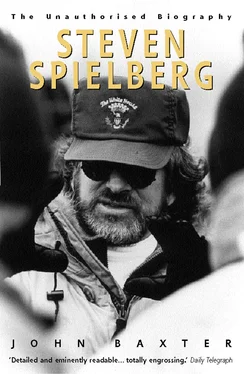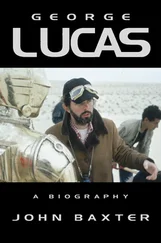Spielberg’s technique to win this audience was to scavenge Hollywood’s scrapyard, salvaging genres and recycling them in widescreen, colour and stereo sound. His ability to resuscitate moribund material was unique. His approach to the shark of Jaws , to Puck, the ‘Little Green Man’ of E.T., Jurassic Park’s velociraptor dinosaurs and the Nazis of Schindler’s List was identical. In each case, he animated a cliché by showing that even cardboard thinks and feels. Not for nothing was he an admirer of Disney’s Pinocchio , in which a puppet is brought to life.
As an added guarantee that the audience would embrace his work, Spielberg preferred never to instigate an idea. The tendency of Lucas and Scorsese to push ahead with their visions, bulldozing all in their path, could produce successes, but Spielberg fed on consensus, not confrontation. Most of his films would be years in gestation, and would often begin with another director. Jaws had been Dick Richards’s film. Close Encounters of the Third Kind originated with Paul Schrader. Phil Kaufman would start as the director of Raiders , John Milius developed 1941, Tobe Hooper Poltergeist , and Hooper, with John Sayles, did the preliminary work on E.T. Empire of the Sun was intended for David Lean. Even Schindler’s List was at one point a Martin Scorsese project.
Just as Spielberg is anything but the common man, he’s also anything but the common artist. His vision is closer to that of a politician or a corporate CEO than to a film-maker. Newsday critic Jack Matthews articulated the truth that had been dawning for some time on the filmmakers with whom Spielberg had grown up in the industry, but whom he is now leaving further and further behind: ‘His contemporaries in the Hollywood firmament are not Scorsese and Coppola, they’re studio execs Jeffrey Katzenberg, Mark Canton, Peter Guber, Joe Roth and the other fortysomething crowd controlling the power.’ The critic Peter Biskind has pointed out how closely Spielberg’s and Lucas’s business philosophies conformed to those of Ronald Reagan, who served as president from 1981 to 1989, throughout the period of their greatest success. Reagan, says Biskind, ‘was the strong father Lucas and Spielberg didn’t know they were looking for, the ideal president for the age of Star Wars ’. In temperament, Spielberg has more in common with the Democrats like John F. Kennedy who saw it as their role to make a world fit for baby boomers to live in. Arthur Schlesinger Jr speaks of Kennedy as ‘a realist and an ironist, a man of sardonic wit and impenetrable reserve who sought to apply reason to the problems of state’. One senses some of the same cool estimate of cause and effect in Spielberg. ‘His direct and unfettered mind,’ Schlesinger continued of Kennedy, ‘freed him to contemplate a diversity of possible courses. At the same time, he was a careful judge of those possibilities and was disinclined to make heavy investments in losing causes… He once described himself to Jacqueline as “an idealist without illusions”.’ Spielberg shares many of these characteristics, albeit in diluted form. He’s even closer, however, to the philanthropic industrialists of a century ago like Carnegie and Frick.
In person, he appears diffident, nervous, unsure, eager to be liked and to have his work approved by the audience, but a frosty stare at moments of threat reveals him as a man who understands power and expects to be obeyed. On the set, he’s fast, focused, saying little to his crew, even less to his cast. He’s animated, however, when talking business. If he is truly an artist, his art is the deal. No Edison or Ford, perhaps – but Federico Fellini was right to say, as he did to Francis Coppola, ‘Spielberg is a tycoon, like Rockefeller.’ When historians assess the 1970s and eighties, during which entertainment and audio-visual media began to dominate large segments of the world economy, Spielberg, along with innovators like Microsoft’s Bill Gates, may well emerge as a major architect of the change.
Millions would be astonished to hear Spielberg called, as he sometimes is, ‘the most hated man in Hollywood’. Admittedly, ‘hate’ is a term so contaminated by self-interest as to be meaningless in show business. The gibe ‘You’ll never work in this town again – unless we need you’ embodies so much conventional wisdom that nobody sees it as a joke. After Spielberg allied with ex-Disney studio head Jeffrey Katzenberg and record producer David Geffen in 1994 as DreamWorks SKG, David Letterman, master of ceremonies of the 1995 Oscar broadcast, joked that the alliance was a time saver; instead of waiting for them to fail separately, Hollywood could now wait for them to fail as a group.
However, even if one replaces ‘hated’ with ‘resented’ or ‘envied’, a residue of genuine dislike remains. Friends and colleagues agree; Steven Spielberg is hard to like. Geffen called him, according to Julia Phillips, ‘selfish, self-centred, egomaniacal, and worst of all – greedy’. Geffen denied the quote, but there are plenty in Hollywood prepared to endorse it, if not for the record. Spielberg can be remote, grasping, sulky, narrow. In his office, he seldom acknowledges anyone except to raise some technical point. He ‘lacked social graces’, one colleague said of his rapport, or lack of it, with his employees. ‘He never asked anybody about their personal lives. His only subject of conversation is the movies.’
But Spielberg shares these characteristics with many – perhaps most – great directors. Fellini, Buñuel and Welles all drew the same criticism. Likewise many of his own contemporaries in New Hollywood. Filmmaking is an art learned in decades alone in the dark with other people’s dreams, and pursued in an environment of inflated egos and expectations, sudden-death deadlines and Brobdingnagian profits and losses. As the matador respects the bull more than the crowd which gathers to see one of them die, directors come to love films more than they love the audience.
During the seventies and eighties, while he was finding his feet, Spielberg was famously approachable. While other directors retired to their trailers between takes and had lunch sent in, he schmoozed with the actors, ate in the commissary and hosted evening screenings of his favourite old movies to which the entire cast and crew were invited. He always entertained his cast at dinner just before shooting, and greeted each of them, ‘Welcome to the family.’ Lucas simply sent a basket of fruit to their rooms.
All this, however, may simply have been more a technique of manipulation than a sign of interest in other people. ‘Directing is 80 per cent communication and 20 per cent know-how,’ Spielberg says. ‘Because if you can communicate to the people who know how to edit, know how to light, and know how to act – if you can communicate what you want… and what you feel, that’s my definition of a good director.’ One of the warmer stories about him describes him winning over ageing star Joan Crawford on his first job by presenting her each day with a rose in a Pepsi-Cola bottle: Crawford was the widow of Pepsi’s chairman. At an American Film Institute seminar, however, Spielberg recollected cynically: ‘I put the day of the week on the Pepsi bottle, and each day I’d give her one. She didn’t know it was a countdown. I couldn’t wait to get off the picture. Oh yeah, I did a lot of that bullshit.’
What sort of man prefers to be seen as a cunning manipulator than a charming collaborator? The same kind who will get up early on a film set to bake matzoh for 150 people? With Spielberg, it is safer to suspect the easy answers. He is stranger than we know – perhaps stranger than we can know.
Читать дальше












